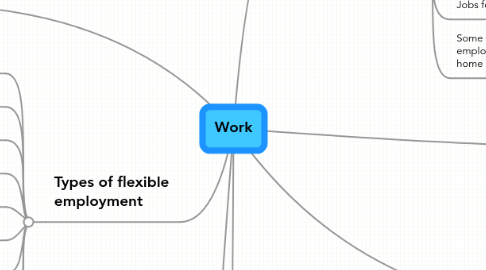
1. Hayek
1.1. Argues trade unions are the cause of unemployment and inflation.
1.2. Unions prevent wage differentials guiding workers to were their skills are most needed
1.3. Believes if left to their own devices, people would price themselves back into work.
1.4. He sees the competitive market as a solution to social order.
1.4.1. No one is self sufficient. An employer must pay the rate for the job, an employee must 'sell' a service that is needed.
2. Flexibility
2.1. Less Job Security
2.2. No more jobs for life
2.2.1. Jobs for life seen as part of the problem of the un-competitiveness of the British industry.
2.3. Shift systems
2.4. Changing practises at industrial plants. i.e the manufacture of several car models at one plant, moving production between several plants.
2.5. Movement of production to other towns or other countries.
2.6. Effects of Flexibility
2.6.1. Inefficient producers driven out of business.
2.6.1.1. Job seekers classed as inefficient is they don't take lower wages.
2.6.2. People with highly desired skills can demand higher wages.
2.6.2.1. Competition between workers intensifies. Some workers cannot compete and this creates a bigger inequality between workers.
2.6.3. During the 70s and 80s there was a gradual loss of power from the wage councils in retail and catering industries. Trade Union membership numbers fell.
2.6.4. Gender inequality in wages. In 1993 women earned 70% of mens wages up from 55% in the late 60s. This is because of a lack of women in high paying occupations.
2.6.5. Men in their 20s change from having most job security, to having the highest level of insecurity.
2.6.6. Women in their 40s heve the highest level of job security.
3. Types of flexible employment
3.1. Part -time
3.2. Temporary
3.3. Fixed term contracts
3.4. Seasonal Work
3.5. Flexitime
3.6. Overtime
3.7. Term Time only
3.8. Sunday working
3.9. Self employment
4. Liberalism
4.1. Individuals are the key,to get on in life they must:-
4.1.1. Work Hard
4.1.2. Learn Skills
4.1.3. Earn More Money
4.1.4. Perhaps buy shares
4.2. Flexible labour markets are the key to efficiently allocating skills where they will be of most use
5. Flexible labour markets can help by :-
5.1. Removing obstacles to advancement
5.2. Curbing trade unions
5.3. Persuading people to move about
5.3.1. Excess demand for skills means higher wages.
6. Keynes
6.1. Social Democrat
6.2. Root of problem of unemployment is:
6.2.1. Uncertainty
6.2.1.1. Lack of orders creates downturn, leads to job losses, newly unemployed spend less, leading to bigger drop in orders, leading to bigger downturn.
6.2.2. Volatility of capitalist system
6.2.2.1. Even if employees worked for nothing, businesses would not produce goods if there was no chance of selling them.
6.3. Solution
6.3.1. Firms pay wage --- wages spent on firms products --- Firm uses revenue to pay wages--- wages spent and so on and so on.
6.3.1.1. Change one link and it affects the entire chain.
6.4. Keynes thinking was that wage cuts were not irrelevant, they could make unemployment worse. Lower wages means lower demand, meaning less revenue.
7. The Golden Age
7.1. Keynes
7.1.1. Low Wages contribute to unemployment they dont alleviate it
7.1.1.1. For unemployment to come down firms need to pay wages, wages are then spent, revenue then used to pay wages, wages are then spent, etc etc.
7.1.2. Low wages or unemployment mean workers have less money to spend, fewer goods are purchased, lower revenues are made, more workers are made unemployed, therefore there's even less money, and fewer goods purchased.
